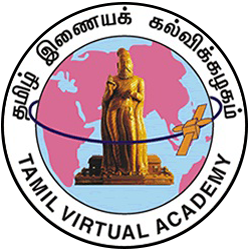Primary tabs
LESSON - 2
D02122 Varaiviyal - II
(Nambi Agaporul - Varaiviyal, Karpiyal, Ozhibiyal)
This lesson further discusses ‘Varaiviyal’, chapter 3 of ‘Nambi Agaporul’. When the lovers themselves choose to sanctify their love through marriage, their ‘kalavu’ is conveyed to their elders through their well wishers. This ensures that their kalavu ends in ‘karpu’ or marriage. This is called ‘arathodu nitral’ and it paves way for ‘varaivu malithal’ or the efforts to unite the lovers in marriage. However, sometimes even before the lovers decide to end their ‘kalavu’ people who happen to know about their meetings begin to speak ill of them. This is called ‘kalavu velipaadu’. ‘Nambi Agaporul’ codifies 3 ‘kilavigal’ or behaviours under ‘kalavu velipaadu’. They are ‘pokku’, ‘karpodu punarntha kavvai’ and ‘meetchi’.
‘Pokku’ is also known as ‘udan pokku’. Fearing that their love may not find fulfillment through marriage, the lovers elope. This is called ‘pokku’. ‘Pokku’ or elopement may occur in 8 different situations. The author also minutely details the ‘kilavigal’ or behaviour under each of these situations. Thus ‘Poku’ comprises 18 ‘kilavigal’.
After the elopement of the lovers their ‘kalavu’ becomes apparent to everyone. The lovers become the talk of the town and people chastise them. This is called ‘alar’. The events that follow in the wake of ‘alar’ are collectively known as ‘karpodu punarntha kavvai’. ‘Kavvai’ denotes the sorrow and dishonour that arises due to the aspersions cast by the people. There are 5 types of ‘kavvai’. They are ‘sevili pulambal’, ‘nattrai pulambal’, ‘kavar manai marutchi’, ‘kandor irakkam’ and ‘sevili pinthedi seral’. These are further divided into several ‘virivuk kilavigal’ or codified behaviour.
When the lovers elope, the ‘sevili’ sets out in search of them. Unable to find them, she returns home. Sometimes the lovers themselves return home to the relief of everyone in the household. These two events are called ‘meetchi’. ‘Meetchi’ is of 4 types. They are ‘thelithal’, ‘magizhchi’, ‘vinaathal’ and ‘seppal’. These 4 types of ‘meetchi’ are further classified into 6 types of ‘virivu kilavigal’ or codified behaviour.
This lesson also discusses the 3 types of ‘varaivu’ or marriage ceremony that happens after ‘udan pokku’ or elopement. The lovers may elope and get married. The lovers who elope may decide to return to the thalaivan’s house and get married there which is known as ‘thanmanai varaithal’. The lovers may return to the thalaivi’s house and get married there. The lesson gives a brief outline of the subdivisions under ‘thanmanai varaithal’.
The
lovers attempt to elope may be foiled by the timely intervention of people
known to them. These people advise the lovers to return home. This
intervention and the subsequent return of the lovers to their home is
called ‘udanpoku idaiyeedu’. ‘Udanpoku idaiyeedu’ is of 4 types.
They are ‘pokku arivuruthal’, ‘varavu arivuruthal’, ‘neekkam’
and ‘irakamodu meetchi’. These are further classified into several ‘virivu
kilavigal’.

